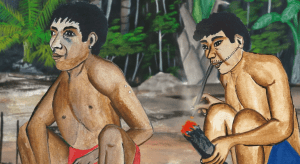By Dr Lorena Becerra-Valdivia, Senior Research Associate, Department of Anthropology and Archaeology
Dr Lorena Becerra-Valdivia tells us about her Leverhulme Trust Early Career Fellowship project which investigates how two major climatic events—the Antarctic Cold Reversal and the Younger Dryas—affected the initial human settlement of South America over 10,000 years ago. Using radiocarbon dating, the project examines whether a correlation exists between climate change and human response, offering new insights into human adaptability that are particularly relevant in today’s climate-challenged world.
As an archaeological scientist, my work focuses on using laboratory-based methods to answer questions about our human past. My primary tool, radiocarbon dating, enables us to determine the age of archaeological objects and human remains, placing them within a secure timeline. Radiocarbon dating works by measuring the amount of carbon-14, a radioactive (unstable) form of carbon (see image below), left in once-living materials. All living organisms contain carbon, including carbon-14. After death, they stop absorbing carbon-14, which then begins to break down at a slow, predictable rate. By measuring how much carbon-14 remains in a sample, we can estimate when the organism died—up to about 55,000 years ago. In archaeology, radiocarbon dating addresses the foundational question of ‘when’ certain events occurred in the past, forming the basis for exploring other key questions—’why,’ ‘how,’ ‘who,’ and ‘what.’ After all, without knowing the chronological context of archaeological findings, we cannot fully interpret their significance, the circumstances of their creation, or the cultures and individuals behind them.

This leads me to my current research project titled, ‘The role of abrupt climatic shifts in the initial settlement of South America’, funded by the Leverhulme Trust until 2026. This project investigates human-climate-environment interactions during the settlement of that continent more than 10,000 years ago, with an aim to assess the impact of two millennia-long climatic phases—the Antarctic Cold Reversal (ACR) and Younger Dryas—on this process. A milestone of the project has been a recent publication in the journal Nature Communications, which presents a cultural timeline—constructed from approximately 150 archaeological sites and 1,700 dates (see image below)—and compares the results against past climatic records. One of the novel findings featured in this publication is that extreme cold conditions did not seem to hinder human occupation in regions hardest hit by the ACR, including southernmost regions like Patagonia and high-altitude Andes. These results underscore the remarkable adaptability of early South Americans and highlight the likely critical role of knowledge transmission for survival during climatic adversity.

The idea for my Leverhulme project emerged from a multi-disciplinary environment in Australia in 2020, as I was helping establish a new radiocarbon dating facility. As is often the case, this new facility was not based within an Archaeology department, but rather within a centralised scientific unit with closer links to Chemistry and Earth Sciences. Here, my colleagues primarily studied past climatic and environmental dynamics instead of human activities. Radiocarbon dating provides a bridge for those who study the past, however, allowing us to connect cultural and climatic events through timeline construction—for instance, aligning archaeological evidence for human migration into Australia with sea-level and temperature fluctuations. As the Leverhulme project approaches its conclusion in early 2026, I am again embracing multidisciplinary collaboration to pivot towards research that applies insights from our ancient past to contemporary challenges such as food security. This next phase will be both challenging and invigorating, requiring me to step beyond my comfort zone. By connecting human and climatic histories, past and present, my new project will aim to demonstrate that understanding the past is essential for addressing current and future global issues.
Dr Lorena Becerra-Valdivia is a Senior Research Associate in the Department of Anthropology and Archaeology with research interests in archaeological science, radiocarbon dating, chronology, past human-climate-environment interactions, and ancient hominin dispersals. To find out more about Lorena’s project and research, please contact lorena.becerra-valdivia@bristol.ac.uk or @lorenabecval.bsky.social.






 Your latest research project, based in the UK, is called Waves of Change – can you tell us more about it?
Your latest research project, based in the UK, is called Waves of Change – can you tell us more about it? 

